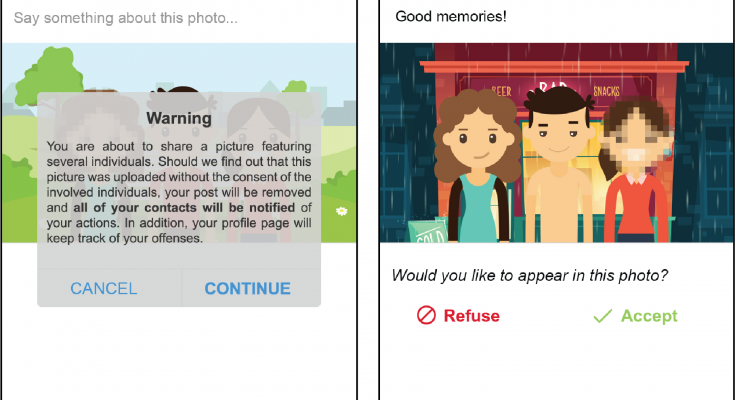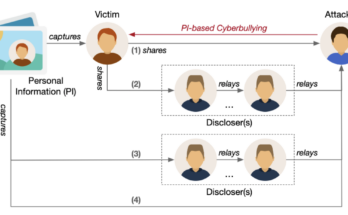Internet users share ever-increasingly multimedia content online (i.e. photos and videos). Most of the shared contents are co-owned data depicting more than one user (e.g., group photos). Sharing co-owned multimedia content without getting consent causes Multiparty Privacy Conflicts (MPCs) and it might have severe privacy implications on the users’ life. In this project, we aim the design and evaluation of novel technological interventions to deter users from sharing multimedia content with other users without their consent. In this project, we design usable privacy-preserving technologies. We also use different experimental approaches such as user studies and longitudinal intervention studies to understand users’ preferences and the effectiveness of the designed strategies in everyday life where real MPC incidences might occur.
In the first phase of the project, we take a user-centric approach and ask MPC-experienced users to design with us and reflect on their experience and creativity to design novel and effective solutions against MPC. We use the well-known participatory design approach inviting social media users who caused MPC and those who suffered from MPC to attend various participatory design activities. In particular, we are interested to explore how existing practices in the justice systems such as deterrence or restoration can be applied in the MPC context and online social networks. The results of the participatory design study are published in a flagship design conference: ACM DIS 2021.
In another attempt, we study how persuasive technologies can influence users toward more considerate and mindful behavior. We explore the use of different persuasive approaches such as reward, punishment, and empathy to discourage users from sharing online. In particular, we designed dissuasive mechanisms; design frictions in the interaction flow that works as mini hurdles to nudge users toward considerate sharing. The results of this study are published in a prestigious HCI venue: ACM CSCW 2021.In the second phase of the project, we leveraged the power of interactive argumentation for conflict resolution. We investigated the potential of a mediator chatbot (called MediationBot) to allow social media users to practice collaborative conflict resolution. Our chatbot design leads to positive findings such as consent collection, the use of middle-ground solutions by social media users, and well-clarified conversations between them. The study is published in ACM CSCW 2023. Our group currently works on further development and investigation of mediator bots.
Project Leaders: Kavous Salehzadeh Niksirat, Diana Korka, Mauro Cherubini, and Kévin Huguenin.
UNIL Collaborators: Marc-Olivier Boldi.
External Collaborators: Jose Such (King’s College London), Hamza Harkous (Google).
Publications
- Salehzadeh Niksirat, K., Korka, D., Harkous, H., Cherubini, M., & Huguenin, K. 2023. On the Potential of Mediation Chatbots for Mitigating Online Multiparty Privacy Conflicts – A Wizard-of-Oz Study. Proc. ACM Hum.-Comput. Interact. 7, CSCW1, Article 142 (April 2023), 33 pages. Temporary Link: https://research.google/pubs/pub51892/ , DOI: 10.1145/3579618
- K. Salehzadeh Niksirat, E. Anthoine-Milhomme, S. Randin, K. Huguenin, and M. Cherubini. 2021. “I thought you were okay”: Participatory Design with Young Adults to Fight Multiparty Privacy Conflicts in Online Social Networks. In Designing Interactive Systems Conference 2021 (DIS ’21), Virtual Event, USA. ACM, New York, NY, USA, 21 pages. DOI: 10.1145/3461778.3462040 [presentation video] [teaser video]
- M. Cherubini, K. Niksirat Salehzadeh, M-O. Boldi, H. Keopraseuth, J. M. Such, K. Huguenin. 2021. When Forcing Collaboration is the Most Sensible Choice: Desirability of Precautionary and Dissuasive Mechanisms to Manage Multiparty Privacy Conflicts. Proceedings of the ACM on Human-Computer Interaction, CSCW edition, 35 pages. DOI: 10.1145/3449127
Blog
- K. Salehzadeh Niksirat. 2023. Keeping Everyone in the Picture: How Chatbots Can Help Mediate Content Sharing Conflict. A research blog on Medium. [Read here]
Talks
- K. Salehzadeh Niksirat. 2021. “I thought you were okay”: Participatory Design with Young Adults to Fight Multiparty Privacy Conflicts in Online Social Networks. Presented in a DESI seminar on May 21st. [Watch here]
Awards
- Two PET members, Kavous Salehzadeh Niksirat and Evanne Milhomme, were given the Epic Experimenter Award 2020 from HEC-LABEX for their experimental research effort on the Multiparty Privacy Conflict project.




